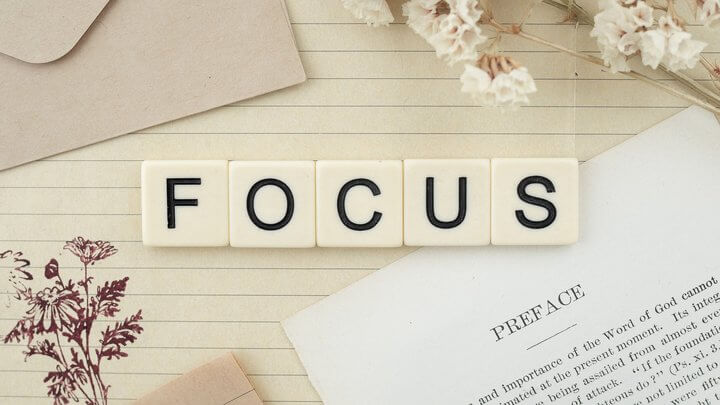The inner critic is that often unconscious nagging voice in our heads that makes us question our worth and abilities. It manifests as a constant, niggling commentary.
The inner critic targets the self as a whole. It criticizes, judges, and attacks our thoughts, actions, and behaviors.
It’s the constant inner dialogue that says, “You always mess things up”, or that we are not good or smart enough.
The inner critic may stem from societal standards, past experiences, and insecurities. It may also be the voice of “resistance”, as Steven Pressfield defines it in his book The War of Art.
Over time, these thoughts can become so ingrained in our minds that we start believing its negative messages as truth. Once we do, we start acting in that way, and without realizing it, we become that person.
But here’s the thing—trying to control or remove your inner critic may not be the answer.
Instead, the key is to shift your focus.
Rather than getting caught up in the critical voice, redirect your energy toward more constructive thoughts. By doing so, you grow beyond the negativity and limitations set by your inner critic.
In this post, we’ll learn about the inner critic and how to transcend it in a way that empowers you to move forward.
It’s not what you say out of your mouth that determines your life,
it’s what you whisper to yourself that has the most power!
― Robert Kiyosaki
How to Go Beyond the Inner Critic
Transcending the inner critic requires a proactive approach. A couple easy ways to transcend your inner critic are:
Practice Self-Awareness
The first step in transcending your inner critic is to become aware of its presence. It may be so ingrained that you don’t even realize it’s there.
Pay attention to the thoughts that arise when you face a challenging situation. Are they helpful or discouraging?
Track your negative self-talk to understand patterns and triggers. Awareness helps you recognize when it’s present, so that you can choose how to respond.
Limit Comparisons
Measuring your progress against someone else’s achievements intensifies feelings of inadequacy or failure. It fuels the inner critic.
Everyone has different strengths, challenges, and timelines for success. You might see someone excelling in an area where you struggle. But what you don’t see are the obstacles they’ve had to overcome or the areas where they feel less confident.
This constant comparison pulls you away from your own growth.
Instead of focusing on what others are doing, turn your attention inward. You have your strengths, experiences, and lessons to learn.
What matters is the progress you’re making in your life.
By focusing on your own improvement, you’ll quiet that inner critic and find more joy in the journey.
Related article: 3 Simple Strategies to Overcome Self-Criticism

The Importance of Focus
When I catch myself having those unhelpful thoughts, I do my best to shift my focus to something more constructive. If I’ve made a mistake, I think about how to do it better next time, or remind myself that I’m doing my best—and that’s enough.
The ability to focus on constructive, empowering thoughts makes a big difference. Use your will-power to direct your energy toward things that help you grow.
Being able to shift from negative to positive thoughts is such a valuable skill. Here are 3 easy and effective practices to help you shift your focus from your inner critic to more positive thoughts:
1. Mindful Breathing
When you catch yourself listening to your inner critic, take a moment to pause and focus on your breathing.
Close your eyes, inhale deeply for four seconds, hold for four, and exhale for four. Repeat this cycle a few times, paying attention to how your body feels as you breathe.
This conscious breathing helps calm your mind and create space for more empowering thoughts.
2. Focus on Gratitude
Shifting your focus to gratitude helps break the cycle of negative thinking and reminds you of the good things in your life.
You can even write them down to make the practice more powerful.
When you focus on gratitude and feel appreciation, you shift your attention to what’s going well. This positive mindset elevates your energy and brings greater clarity to your thoughts.
3. Use Affirmations
Having a few go-to affirmations can be a great way to redirect your focus. When your inner critic is loud, repeat affirmations that resonate with you, like “I am capable,” “I am worthy of success,” or “I am enough.”
Also, remember that your emotions must reflect your thoughts. So feel capable, feel worthy of success, and feel you are enough. That’s when you move your energy in a positive direction.
Over time, you’ll find it easier to shift your mindset when negative thoughts arise.
Remember, the only reason why the inner critic can make us feel bad is because we choose to believe what it says.

Emotional Toll of Listening to Your Inner Critic
A dominant inner critic can have profound emotional effects. Persistent negative self-talk can erode your sense of self-worth. This lowers your self-esteem and makes it difficult to recognize your strengths and capabilities.
The inner critic limits personal growth by creating fear of failure. It keeps you in your comfort zone, hindering your ability to take risks and explore new opportunities.
Furthermore, it generates a lot of stress, which manifests through headaches, fatigue, and other stress-related ailments.
Common Phrases from the Inner Critic
Here are some common phrases or thoughts often driven by the inner critic:
- “I’m not good enough.”
- “I’ll never succeed.”
- “I always mess things up.”
- “No one will like me.”
- “Everyone is better than me.” Or, “I’ll never be as good as them.”
- “I don’t deserve happiness or success.”
- “I should have done better.”
- “I’m a failure. I can’t do anything right.”
- “Why bother trying? I’ll just fail again.”
- “They’re going to figure out I’m a fraud.”
- “It’s too late for me to change.”
- “People will judge me if I make a mistake.”
- “I can’t handle this.”
By recognizing these phrases, you become better equipped to redirect your thoughts.
Failure is only bad when you equate it to your self-worth.
– Wayne Dyer
Benefits of Transcending Your Inner Critic
Transcending this inner fault-finder also has significant long-term benefits:
A more positive self-image.
By quieting the inner critic, you free yourself from constant self-doubt and harsh judgment. This leads to a healthier mindset, where you see yourself in a more positive light.
Enhanced well-being.
By transcending your inner critic, you reduce stress and create more room for self-compassion and peace. You’ll feel lighter and more at ease, which has a positive impact on your well-being and daily happiness.
Willingness to take risks, explore new opportunities, and express your creativity.
When you no longer allow your inner critic to hold you back, you’ll feel more confident and open minded. You start taking chances and exploring new paths.
Constructive Self-Reflection vs. the Inner Critic
Constructive self-reflection can be a helpful tool for growth and improvement. However, there is a significant difference between healthy self-reflection and the inner critic.
The key distinction lies in the intention behind your thoughts.
Self-reflection comes from a place of curiosity and compassion. And it’s constructive, because it helps identify mistakes and areas for improvement. You might ask yourself, “What could I improve?” or “What did I do well here?” The goal is to make progress, not to tear yourself down.
It’s when you reflect on your actions and choices with the intention of learning from them. You get the opportunity to grow into a better version of yourself.
This type of reflection helps you learn and move forward in a positive way.
In contrast, the inner critic’s intentions are rooted in fear, shame, and self-doubt. Its goal is not to help you grow, but rather to keep you stuck in negative patterns.
Instead of progress, it focuses on your perceived flaws and failures, making you feel powerless.
The inner critic can stifle motivation and lead to a distorted self-image.
Knowing this difference can help you see where your thoughts come from. Then you can use your will-power to shift your focus to more empowering ones.
Self-compassion and constructive thinking will always take you further than your inner critic.

Wrapping It Up
The inner critic is not an inherent part of who you are. It’s a learned behavior and thought pattern that can be unlearned. You’re not aiming to silence it completely — that’s unrealistic.
But you can reduce its power over you by shifting your focus toward constructive thoughts and compassionate self-talk. With practice, you can transcend it and cultivate a more empowering mindset.
So the next time that pesky inner voice shows up, take a deep breath and remind yourself: you have the power to choose which thoughts you entertain. Choose wisely and focus on thoughts that help you thrive.
You are capable and worthy of success and happiness. Believe it, and let your inner critic fade into the background.


0 Comments